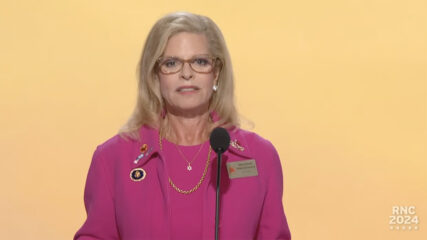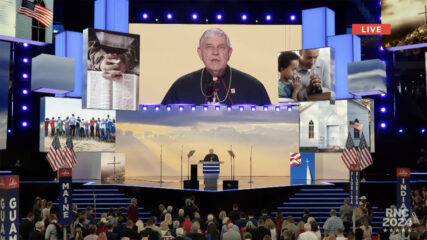
(RNS) — Connecticut businesswoman and former U.S. Senate candidate Leora Levy’s prayer before this year’s Republican National Convention was filled with distinctive Jewish references. After thanking God on Monday night (July 15) for former President Donald Trump, Levy, who is on the national leadership of the Republican Jewish Coalition, prayed for Corey Comperatore, who was killed during the assassination attempt on Trump’s life over the weekend, saying, “May his memory always be a blessing.” She referenced the Hebrew Bible, citing Deuteronomy 31:6, which begins, “Be strong and courageous.” She prayed for Jerusalem and for “all the children of Abraham.”
But as Levy spoke, the wall of giant screens behind her projected images of American flags flying next to Christian crosses and churches.
The scene was similar later that evening, when what appeared to be the same images flashed behind Harmeet Kaur Dhillon, a National Committeewoman of the Republican National Committee for California, as she led the assembly in prayer. She, too, lauded Trump and thanked God for protecting him from harm, but hers was a Sikh prayer, during which she also thanked God for “creating America as a unique haven on this earth, where all people are free to worship according to their faith.”
The awkward visual contrast encapsulated the sometimes fragile alliance the modern Republican Party hopes to assemble this election cycle, when forms of Christian nationalism are ascendant in the GOP even as it is also seeking to widen its tent and rally more voices — and votes — around Trump.

Leora Levy, of Connecticut, prays at the Republican National Convention, Monday, July 15, 2024, in Milwaukee, Wis. (Video screen grab)
To be sure, explicitly Christian prayers were also in ample supply throughout the evening. Archbishop Elpidophoros, an Greek Orthodox bishop, and Archbishop Jerome Listecki, who oversees the Catholic Archdiocese of Milwaukee, both offered broad, more general prayers.
But when politicians invoked the divine — specifically, the Christian God — virtually all of their orisons had the same focus: Trump.
Many suggested God protected Trump from harm during the assassination attempt on his life. Rep. Marjorie Taylor Greene of Georgia, one of two members of Congress who openly identifies as a Christian nationalist, told the assembly, “I thank God that his hand was on President Trump.”
When Sen. Tim Scott of South Carolina referenced God while celebrating what he framed as Trump’s courage during the attack, he appeared to link Trump’s survival with the belief that the U.S. is a distinctly Christian country.
“If you didn’t believe in miracles before Saturday, you better be believing right now,” said Scott, an evangelical Christian. “Thank God Almighty that we live in a country that still believes in the King of Kings, and the Lord of Lords, the Alpha and the Omega. Our God — our God — still saves. He still delivers. And he still sets free.”
Near the end of the evening, the Rev. James A. Roemke of Kenosha’s Messiah Lutheran Church, a congregation in the Lutheran Church Missouri Synod, offered a benediction. But before he began, he impersonated Trump’s voice and mannerisms, telling the crowd, “you’re going to be so blessed, you’re going to be tired of being blessed, I guarantee it.” The crowd roared in response, as Trump — who had entered the assembly with a bandaged ear, which was hit by a bullet on Saturday — applauded and smiled.

The Rev. James A. Roemke impersonates Donald Trump at the Republican National Convention, Monday, July 15, 2024, in Milwaukee, Wis. (Video screen grab)
The Republican Party has long appealed to Christian voters, which make up around 84% of the party — with white evangelicals alone making up 30% of the party — according to the Public Religion Research Institute. By contrast, Democrats are roughly 60% Christian as of 2022, with only 4% of the party identifying as both white and evangelical.
But in an election where narrow margins are likely to make a big difference, Republicans appear to be aiming to broaden their coalition. The RNC stoked controversy for moderating its stances on abortion and LGBTQ+ rights this year, for instance, moves that have angered some of the party’s conservative Christian base.
“Christ-less conservatism will never change America,” Sean Feucht, a prominent activist and Trump supporter, tweeted on July 8, after the RNC released its platform, which backed off from anti-abortion issues.
The mere existence of non-Christian voices at the RNC was enough to spark backlash from a spectrum of religious conservatives. Thomas Kidd, a professor at Midwestern Baptist Theological Seminary, criticized Dhillon’s Sikh prayer, posting on X, “It would be better to have no prayers than this type of ‘COEXIST’ pabulum.”
Conservative commentator Candace Owens, whose views on her Christian faith and Israel have stoked controversy even in far-right circles, was also critical of Dhillon’s prayer. In her live YouTube show on Tuesday, Owens praised Dhillon as a person who “punches for America,” but said Owens’ personal reaction to the prayer was to say to herself, “literally why?”
“This is not something that patriots are rallying behind,” Owens said.
Owens pointed to the broad rejection by many conservatives of diversity, equality and inclusion initiatives, also known as DEI, saying: “Are we now the party that critiques DEI and then also practices it at certain points?”

Archbishop Jerome Listecki addresses the Republican National Convention, Monday, July 15, 2024, in Milwaukee, Wis. (Video screen grab)
In addition, Nick Fuentes, a white supremacist and self-identifying Christian nationalist who dined with Trump in 2022 and leads a far-right movement that has largely supported Trump, railed against the prayer online, incorrectly condemning it as a “Satanic Hindu prayer” and deriding it as “blasphemy.”
The Sikh Coalition declined to comment on Dhillon’s prayer, and the Republican Jewish Coalition did not respond to requests for comment.
It’s an open question as to whether the far-right fury over Dhillon’s prayer reflects the views of anyone in attendance at the RNC, but conflicting religious visions were already on display in the crowd on Monday night. As Levy led her prayer, infused with aspects of her Jewish faith, the C-SPAN camera panned to a crowd of RNC delegates and focused on one man in a white shirt emblazoned with a slogan.
It read, in all caps: “Jesus Christ is King.”
Source link




